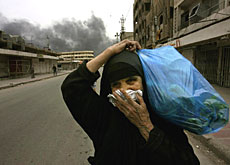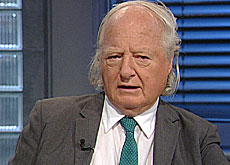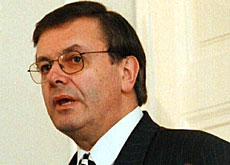Bush administration remains resolute over Iraq

A week after the outbreak of war in Iraq, British prime minister Tony Blair has admitted that London and Washington cannot resolve the Iraq question by themselves.
Blair, who met President Bush on Wednesday, has argued that the United Nations should be involved in deciding the future of Iraq if Saddam Hussein is deposed.
But he may have problems convincing Bush of the need to give the UN a central role in a post-war Iraqi administration, according to Paul Smyke, a Swiss-American political analyst based in Boston and Victor-Yves Ghebali, a specialist in European-US relations in Geneva.
swissinfo correspondent Frédéric Burnand asked Smyke and Ghebali about the strategy likely to be pursued by Washington as the war continues.
swissinfo: Are the difficulties the US and British troops are experiencing on the ground in Iraq likely to lead to a change in policy?
Victor-Yves Ghebali: The Bush administration is facing a reality check, something it has not had to deal with since September 11, 2001. But it is too early to say whether this reality check will have an effect on the policies currently being followed by Washington.
Paul Smyke: What we must realise is that the Bush administration – and a large part of the American population – think the world has not fully appreciated the impact of the September 11 attacks.
These attacks have changed the US forever. People think about it on a daily basis and every day the Bush administration is asking if today one of its cities will be wiped out in a terrorist attack.
So Bush has one priority: to avoid a repetition of such an attack. And to achieve that objective the American president has issued a warning to the rest of the world that will not change: either you are for us or you are against us.
The Iraqi crisis has caused great damage to European-US relations. Is that likely to continue?
V.-Y.G.: It is in fact the worst rift caused by this crisis. Relations – based on common interests and common values – have suffered an unprecedented blow. Today we share no common values.
The Bush administration considers European countries as its subjects, and not as partners. If this administration is re-elected at the next presidential elections in 2004, the break with Europe will be complete.
P.S.: This administration is very sure of itself. The arguments put forward by France, and shared by a large part of European public opinion, therefore have very little impact on it…
The American government is determined to follow to the end the hard line that it has adopted. The negative fallout from following this line is considered of secondary importance.
Despite that, can the UN play a role in the reconstruction of Iraq, as France and Britain hope?
V.-Y.G.: The likeliest scenario – given the state of mind of the Bush administration – is that the UN will be excluded from the reconstruction of Iraq and the formation of a new Iraqi government.
However, it is possible to imagine US officials carrying out the reconstruction of Iraq under UN auspices. But that would mean the UN accepting retrospectively the US-British invasion of Iraq, something which France rejects.
P:S.: The UN has never been a priority for the Bush administration. It’s unilateralism which is the dominating policy today.
Even if almost everyone supports the war in Iraq, some parliamentarians – especially Republicans – criticise the way it has been handled on a diplomatic level. Democrat candidates for the next presidential election, for example, say it wasn’t necessary to quarrel with America’s European allies.
This war is a heavy burden on the US budget. Doesn’t that worry the Americans?
P.S.: It is an growing worry. Lots of people, even on the right of the political spectrum, are asking how the US is going to pay for all these operations (anti-terrorism, the war in Afghanistan, the war in Iraq, and the reconstruction of Iraq…). Especially since the government has decided to cut taxes.
Interview swissinfo: Frédéric Burnand (translation: Morven Mclean)
swissinfo spoke to Paul Smyke and Victor-Yves Ghebali about the Bush administration’s stance on the war in Iraq.
Ghebali believes the administration is facing its first reality test since the September 11 terrorist attacks. But it is too early to say whether this will affect US policies.
Preventing such attacks is Bush’s main priority making him vigilant in his warning – “either you are with us or against us”, Snyke says.
Relations between the US and Europe have suffered an unprecedented blow, according to Ghebali.
Smyke believes the American government is determined to follow to the end the hard line that it has adopted.
On the role of the UN in the rebuilding of Iraq, Ghebali believes the likeliest scenario is that the UN will be excluded from the reconstruction.
Smyke says the UN has never been a priority for the Bush administration.
He also says that the cost of the war in increasingly a concern to Americans, especially since the US government has decided to cut taxes.

In compliance with the JTI standards
More: SWI swissinfo.ch certified by the Journalism Trust Initiative




You can find an overview of ongoing debates with our journalists here. Please join us!
If you want to start a conversation about a topic raised in this article or want to report factual errors, email us at english@swissinfo.ch.